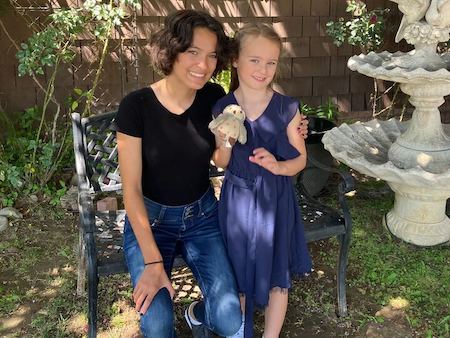

The four women who are experiencing a medical journey together. Left to right: Sarah Garot, Kayla, Carole, Phebe
Receiving any diagnosis can be scary. But getting diagnosed with a disorder that potentially affects your children and their descendants is intimidating. Sarah Garot was treated earlier this year for familial adenomatous polyposis (FAP) and possesses the knowledge to support her daughters through their journey.
FAP is an inherited genetic disorder characterized by the formation of hundreds of polyps in the colon and rectum. These polyps, if left untreated, have the potential to transform into cancer over time. The disorder is caused by a mutation in the adenomatous polyposis coli (APC) gene, which plays a critical role in controlling cell growth in the colon. Individuals with FAP have a 50% chance of passing the mutated gene on to their offspring, leading to generations of affected individuals within a family.
Garot’s mother underwent a colonoscopy when her healthcare team discovered a tumor in her rectum. Unsure if colorectal cancer ran in their family, Garot decided to receive the procedure as well when they found hundreds of polyps in her colon — not cancer but the potential to become cancerous. Suspecting she had FAP, her doctor referred Garot to Loma Linda University Health to be seen by gastroenterologist Timothy Yen, MD, who subsequently performed genetic testing confirming the diagnosis.
Garot had her colon removed in June by Loma Linda University Health colorectal surgeons and decreased her likelihood of colorectal cancer from 100% to 1%.
“Her mom getting colon cancer saved at least three family members from definitively developing cancer from FAP,” Yen says. “Genetic testing is one of the few things in healthcare where we can protect the future of an entire family.”
Yen worked with Garot to determine which family members should undergo genetic testing to identify if they also had FAP. Surprisingly, Garot’s mother tested negative, but both of Garot’s daughters tested positive. Though it is an inherited condition, Yen believes FAP in this family line begins with Garot. Kayla, 16 years old, and Phebe, 6, are carriers of FAP and have a 50% chance of passing the disorder to their children. With Garot’s steadfastness in getting the colonoscopy, receiving a FAP diagnosis, having her colon removed, and getting her daughters genetically tested, her family can proactively test and treat accordingly. In addition, reproductive technologies such as pre-implantation genetic testing are now able to help prevent family members from passing FAP onto subsequent generations.
“I’m concerned for both of my daughters, but Kayla is a teenager; it’s a very delicate time,” Garot says. “She’s finding out who she is and trying to navigate what the future holds. To throw this in the mix, it worried me a little more.”

Kayla and Phebe are too young to receive surgery immediately. Kayla is actively undergoing tests, like colonoscopies, and meeting with specialists to identify the appropriate time for her surgery. Garot plans on educating Phebe more on their genetic disorder as she gets older and will have to monitor for symptoms until it is the appropriate time for treatment.
FAP is notorious for its array of symptoms, some of which could be attributed to other common gastrointestinal problems. There are a few key indicators that individuals should be vigilant about and request a diagnostic colonoscopy:
- Abdominal Pain and Discomfort: Recurrent abdominal pain, cramps, and discomfort are often early signs of FAP. These symptoms can arise due to polyps in the colon and rectum.
- Change in Bowel Habits: Unexplained changes in bowel habits, such as alternating between diarrhea and constipation, or experiencing sudden urgency, can signal an underlying issue.
- Rectal Bleeding: Blood in the stool or rectal bleeding should never be ignored. While it can have various causes, it is crucial to rule out the possibility of FAP, especially in individuals with a family history of the condition.
- Anemia: Chronic bleeding from polyps can lead to anemia and could manifest as fatigue, weakness, and paleness.
- Unexplained Weight Loss: Drastic weight loss without a clear cause could be indicative of an underlying gastrointestinal issue, including FAP.
Read: Expert addresses 4 common concerns about screening for colorectal cancer
Yen says due to the nonspecific nature of its symptoms, FAP can go undiagnosed for years and is often discovered when the polyps progress into cancer. Luckily, Garot’s FAP was caught in the early stages, and genetic testing allows her daughters to initiate appropriate management and prevent complications with their early diagnosis.
What all began with her mother’s unrelated colorectal cancer, Garot discovered and treated her rare inherited condition and can be there for her daughters through their inevitable journey with FAP.
“It was really hard to get past the mindset of ‘I gave my kids and their future children a genetic disorder,’” Garot says. “But my mom felt bad thinking she potentially passed down cancer. That wasn’t the case, but I can talk to her about those feelings and how to be there for them as a mother.”
Garot exemplifies the resilience and determination required to confront such complex medical conditions head-on. Garot and her daughters are seeking others with FAP in hopes of building a community support group to share experiences and not feel alone during a rare diagnosis. Send an email to [email protected] if you are interested.
Loma Linda University Health is the only in the region to offer comprehensive cancer genetics care for FAP and other inherited gastrointestinal cancer syndromes. Learn more here.




